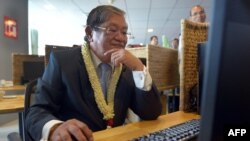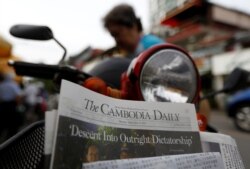In a move that local journalists and rights analysts believe could further curtail press freedom, Cambodia’s government has formed a new journalism ethics committee to monitor the media.
Details of the 15-member Monitoring Committee for Journalism Ethics were announced in an Information Ministry directive this month.
The body will be made up of 10 government officials, the president of a press union who is also a government official, and four media representatives.
“The committee is tasked to monitor and evaluate ethical conduct among journalists and media outlets and to allow the ministry to appraise or punish the media outlets or reporters,” the directive says. “The committee will also examine all complaints by the public against journalists and media outlets.”
The Information Ministry did not detail what punitive measures journalists could face, but Minister of Information Khieu Kanharith will ultimately decide what action should be taken, spokesperson Meas Sophorn told VOA Khmer.
Reporters not 'scared' of being called out
A few days before the committee details were announced, Kanharith spoke about his concerns for journalism during an online forum on the ethics of Facebook Live broadcasts, organized by the government-affiliated Club of Cambodian Journalists.
The minister criticized journalists and news outlets for not following codes of ethics and said that the media rarely called out bad journalism, which meant reporters were not “scared” by unprofessional behavior.
“We have more than 50 journalist NGOs and associations, but is there even one who dares to denounce journalists who write unprofessionally? There is no association who dares. This is the weakness,” Kanharith said at the forum.
Media rights groups, however, say the wider problem for Cambodia’s press is a lack of space for independent reporting.
The country ranks 144th out of 180 countries on Reporters Without Borders’ annual world press freedom index. The media watchdog, known by the French initialism RSF, says Prime Minister Hun Sen “launched a major pre-emptive offensive against the media that devastated the journalistic landscape.”
In 2017, the government shut down The Cambodia Daily, an independent newspaper, for alleged tax avoidance. Its crosstown rival, The Phnom Penh Post, was sold in 2018 to a Malaysian investor.
Authorities have imprisoned journalists for alleged incitement or claimed that reporters were acting in an unethical or unprofessional manner. The independent Cambodian Journalists Alliance documented 35 cases of harassment affecting 72 journalists in 2020 and said that at least 10 reporters were convicted or are awaiting trial.
Among those are Ros Sokhet of the Cheat Khmer newspaper, radio journalist Sok Oudom and online reporter Sovann Rithy, all of whom were arrested in 2020. Sokhet and Rithy were arrested after their critical reporting on the government’s response to the coronavirus pandemic. Oudom had been covering a land dispute involving the military.
Independent body?
The composition of the ethics committee, which predominantly features government representatives, was flagged as a concern by local media bodies.
Nop Vy, executive director of the Cambodian Journalists Alliance, which is on the ethics committee, applauded the move to have such a body but said the government should not have mechanisms to monitor the media.
“If the Information Ministry has the intention to set up a committee to promote and praise journalists, we can move to another step to ensure transparency and equal members on the committee,” Vy told VOA. The committee should have equal voices from media associations and independent journalists, he added.
Ith Sothoeuth, media director at the Cambodian Center for Independent Media, was also concerned about the committee having too many government representatives. He said the government tended to praise journalists close to the officials but called independent journalists the “opposition.”
“Maybe it seems too early to evaluate this new [committee]. But in my observation, the ministry’s mechanism doesn’t fully support independent journalists,” Sothoeuth told VOA Khmer.
Local reporter Khut Sokun, who covers land disputes and social injustice for the news website and radio station Voice of Democracy, said he was concerned that the committee would not fairly evaluate coverage critical of government excesses.
“If our articles are being evaluated, I am concerned, since there will be no independent journalists as members on the committee,” he said.
While the Cambodian Journalists Alliance is considered independent, the committee’s decisions will be approved if more than half the body — which is predominantly made up of government officials — is in agreement.
International media freedom groups raised questions about the independence of the ethics committee, which they said could become another way for authorities to curtail free speech.
“It is perfectly healthy in a democracy for the media to be held accountable for the content they produce,” Daniel Bastard, head of RSF’s Asia-Pacific desk, said in a statement. “But let's not be fooled. This ethics committee will act without any independence from the government, without any transparency as to the decisions it issues, and without any recourse for the journalists it sanctions.”
The Belgium-based International Federation of Journalists also warned the committee could be used to stifle critical journalism and intimidate journalists. The federation added that it was an affront for the government to think it could be arbiters of journalistic ethics.
Attempt at 'sabotage'
Ministry spokesperson Sophorn pushed back against the criticism, saying it was an attempt to “sabotage” the government’s efforts to support ethical journalism.
“If they don’t work ethically, will we leave them like that?” he asked VOA Khmer. “We haven’t done any work, but there are baseless concerns on the work of the committee.”
Government officials have previously asked the Information Ministry for advice on handling the media. In July, Kandal provincial Governor Kong Sophorn asked the ministry for guidance on what to do when journalists “violate authorities’ work” and act in an unethical or unprofessional manner, according to a ministry announcement seen by VOA.
Officials and the police in the province have also prevented journalists from documenting forced evictions or land disputes.
Last week in the Cambodian capital, Phnom Penh, security forces harassed two journalists, including one who was on assignment for Voice of America, as they documented the eviction of residents at a large development project. The reporters were forced to delete their photos.
This story originated in VOA’s Khmer Service.






